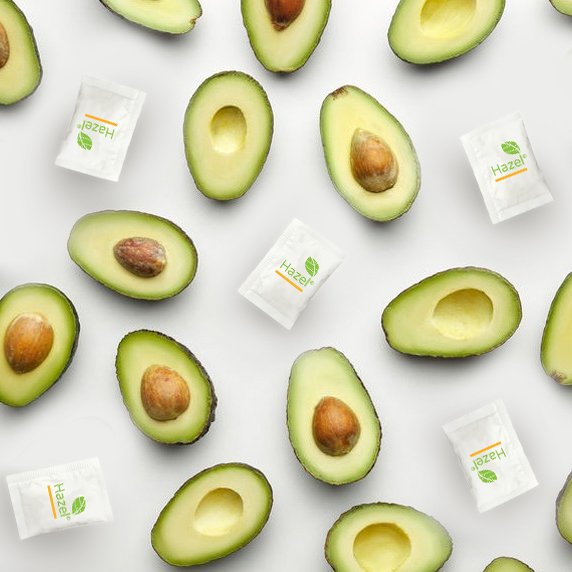Hazel Technologies, a startup fighting food waste, has closed an oversubscribed $13 million Series B funding for its package technology that helps extend foods’ shelf life. The round was led by Pangaea Ventures, which focuses on advanced materials venture capital, alongside existing ag-focused investor S2G Ventures.
Additional backers include the Jeremy and Hannelore Grantham Environmental Trust and Asahi Kasei Ventures, who joined returning investors Rhapsody Venture Partners, Serra Ventures, Valley Oak Investments, Climate Impact Capital, ImpactAssets, and others.
The round brings Hazel’s total capital raised to $17.8 million.
“We have proven that the marketplace wants what we are selling and we are putting the infrastructure in place to scale up the process in terms of manufacturing and distribution this year,” CEO Aidan Mouat told AFN.
Founded in 2015, Hazel has developed a package insert that releases vapors to triple the shelf-life of produce by slowing the aging process and preventing fungus or decay, according to the company. The sachets can be placed in bulk boxes of produce at the packing house to help ensure that they arrive at the supermarket in prime condition.
The active compounds Hazel uses, like an ethylene inhibitor, are standard compounds that have been on the market for a few decades, Mouat explained. Instead of synthesizing new chemicals that carry risks like unknown food safety hazards, the company decided to find a new and better way to apply the chemicals.
“Delivering gases into atmospheres is tricky. Not every packer has a set up to let them do that work manipulating low concentrations,” Mouat said. “We decided to make a better delivery mechanism and to integrate with packaging that anyone in the world could use at any time.”
The company has conducted over 100 pilot trials on a range of produce including melons, okra, apricots, avocados, and cherries. The trials included Dresick Farms International, the tenth largest grower by acreage in California, and Agritrade Farms International, one of the largest specialty vegetable growers in Latin America.
The research has also undergone trials by some of the country’s leading academic research programs including Cornell University and UC Davis.
Mouat says that the new funding will primarily be used to support the company’s back-end expansion. Hazel will more than double its young team, whose average age is 31 and which 60% female, bucking venture and agriculture industry trends.
Hazel is also eyeing a few new products, like antimicrobial packaging for berries, grapes, and other fruit that is susceptible to fungal problems. It’s also working on applications for meat products that it plans to launch over the next 12 months.
“We are looking at touching every perishable category that’s in the world to extend the shelf life of perishable goods. We have already been in retail-oriented conversations to get retailers on board with using Hazel as part of their technology stack,” Mouat adds. “The key takeaway is that we think you will see Hazel deployed in the supply chain everywhere.”
So far, Hazel is primarily focused on B2B distribution channels like packing houses, forming relationships with what Mouat describes as “lighthouse companies” that can bring attention to Hazel’s name.
“As we create more integrated packaging technology, like functional packaging materials such as plastics, papers, and so forth, a whole new market channel will open up,” he said. “We are also looking to engage packers and sellers of the bulk materials that go into packing and distributing produce as a separate market channel.”
The global produce industry represents a $278 billion market, making it a glittering target for supply chain innovation. But the enormity of the industry also presents its greatest challenge: navigating the produce industry means working with countless different government regulations, negotiating with midstream producers, and navigating customs.
“The scale of the problem we are tackling is huge. Last year we treated 700 million pounds of produce and we estimate that we saved about 60 million pounds from going bad,” explains Mouat. “But we need to get to trillions of pounds to say we are touching enough agriculture to make enough of a difference.”
Other startups are entering the market with solutions to tackle food waste at different points in the supply chain. Indeed, food waste startups raised $125 million in 2018 alone.
“There’s a lot of coatings and waxes aimed at slowing the rate of water and oxygen transmission across the surface of produce. Our product is more effective in controlling those things because we offer a technological edge that some waxes can’t achieve,” Mouat says. “Our product adds value no matter what. We don’t tell them to stop using other things.”
Though still early to market, investors seem to share Mouat’s optimism for the technology. “Pangaea has been following Hazel’s progress since 2016 when we first spoke to Aidan,” Keith Gillard, general partner at Pangaea Ventures, wrote to AFN. “We’ve looked at many other opportunities in food waste but never been convinced to invest until Hazel’s Series B.”





